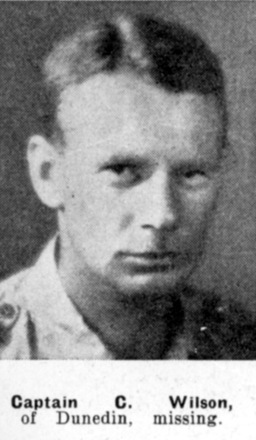
OTAGO CASUALTIES
Captain Clifford Wilson, who has been reported missing, is 34 years of age, and prior to leaving on active service was shipping clerk at the National Mortgage and Agency Company, Ltd., Dunedin, where he took up employment in April, 1924. He held a commission as captain in the infantry, Territorial Force, prior to enlisting, and at that time resolved to make the army a career. Captain Wilson was born on the Isle of Man, and came to New Zealand as a boy. He is a keen sportsman, being particularly interested in deer stalking and duck shooting. He attended McGlashan College. His wife, Mrs D. O. D. Wilson, resides at Woodhaugh. A brother lives at Longburn, and a sister at Gore. -Otago Daily Times, 1/7/1941.
PERSONAL
Advice has been received that Captain (now Major) Clifford Wilson, who was reported missing after the Crete campaign, is a prisoner of war. -Evening Star, 2/8/1941.
POSTHUMOUS AWARD. Captain Clifford Wilson, who was killed in action in Crete and posthumously awarded the Greek Military Cross, Class C. Captain Wilson was an old boy of John McGlashan College, being dux of the primary school in 1922. His name was first on the list of Otago volunteers when war broke out. In Crete he was placed in command of a Greek battalion. It was surrounded, and Captain Wilson was killed at the head of his troops. The officer commanding the Germans paid a tribute to his gallantry and paraded a detachment of the captured forces to bury him. -Evening Star, 17/10/1941.
GALLANT OFFICER
LEADER OF GREEK TROOPS
TRIBUTE BY GERMANS
The gallantry of a New Zealand officer, the late Captain Clifford Wilson, of Dunedin, and formerly of Gore, during the campaigns in Greece and Crete, is recorded in letters received by his widow from his commanding officer, Lieutenant-colonel Kippenberger, D.S.O. He states that Captain Wilson, who was killed in Crete, was repeatedly put in vital positions during the Greek campaign, and in Crete he was sent with half a dozen non-com-missioned officers, to train and command a Greek Battalion, which he inspired.
“His headquarters were surrounded, but the fight went on, the Greeks being inspired by Cliff.” the letter says. “He was shot through the heart and died without a word. Four of the men who were captured obtained permission from the Germans and they made a cross, carried it through Galatos, and out through the famous Prison Valley to where he was buried. They erected the cross, and they saw a Greek woman living near, who promised to look after the grave during the war.”
A letter has also been received from Dr R. Kirk, formerly of Dunedin, paying a tribute to Captain Wilson’s gallantry. He says that when Captain Wilson was killed, the rest of the men surrendered, and on being taken prisoner were asked by a German officer who had led them so well. When the German found that it was Captain Wilson and he was dead, he gave instructions for him to have a separate grave.
The posthumous award of the Greek Military Cross was made to Captain Wilson. -Evening Star, 17/11/1941.
"Cliff" Wilson was a Territorial soldier before World War Two, and was one of the first two Territorial officers to answer the call to action in 1939.
In the Official History of his wartime unit, 20 Battalion, 2NZEF, his name first appears in the training phase in New Zealand, showing a certain amount of creative thinking: Many were the ruses employed to obtain information that might sway the action. In those early days fifth-column work was much more than a name. The people of Tai Tapu entered heartily into the spirit of the manoeuvres, though strangely enough their sympathies appeared usually to lie with the attackers. On one occasion the attacking force, C Company, illegally sent an advance party into the township before the arrival of the defenders. The party was secreted in a barn but failed to achieve its purpose as it was discovered, much to A Company's indignation, and made prisoner. Another time Captain Cliff Wilson, the second-in-command of C Company, dressed as a civilian, rode through the defensive area at dusk on a horse and thoroughly reconnoitred the dispositions of the defenders under the pretext of looking for two stray cows.
Wilson was active in the campaigns leading up to his last, in Crete. He was detached to command a section of Greek soldiers and this is how he met his fate: Thus ended the first day. The paratroops who had landed in the New Zealand sector had suffered heavy casualties, but 22 Battalion had been forced off Maleme aerodrome and the enemy now had a field where he could land reinforcements. Months later it was learned that one of the first battalion casualties was Major Cliff Wilson, attached to 8 Greek Regiment. When their area had been surrounded by paratroops Major Wilson and the other New Zealanders had assembled at a pumping station on a hill south of the reservoir. The station consisted of a small concrete compartment dug into the hillside. It was locked by a narrow steel door, in front of which the clay excavated from the hole had been heaped on either side of the entrance, making a sort of alley leading up to the door — ‘a slit trench with one end open’. The party took shelter inside the tanks, standing thigh deep in water in the darkness while Germans moved around in the vicinity. Unable to break out, the party was forced to remain in hiding. The next afternoon Major Wilson went out to investigate the position. He moved along, looking over the left-hand parapet, and had just called to the others to follow him — ‘Come down and have a go; there are about five of them down here’ — when he was killed instantly. Shortly afterwards the rest of the party was captured.
 |
| Gore Cemetery. |
No comments:
Post a Comment